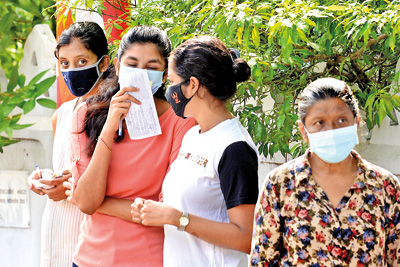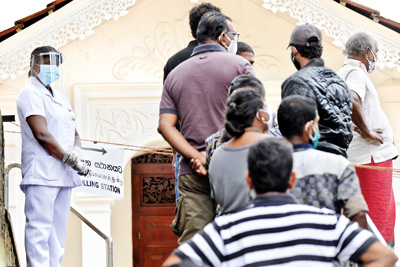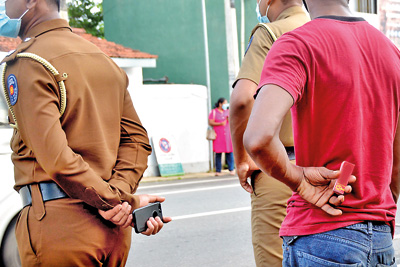News
Voters brave COVID fear: Lanka shows how elections can be held amid pandemic
View(s):Fears of low turnout owing to COVID-19 proved unfounded as voters swarmed out for Wednesday’s 2020 Parliamentary elections.

An election with unprecedented features in the face of COVID. Pix by Indika Handuwala
The first poll to be conducted in South Asia amidst a global pandemic is testimony to the organisational skills of the Election Commission which was assisted by numerous others like Government officials, police and, this time, the health sector too. Their efforts and repeated assurances of safety led to a healthy overall voter turnout of 71 percent. Admittedly lower than the 77 percent notched at the 2015 Parliamentary poll, it was a victory for planners given the circumstances.
There were unprecedented features in the manner the election was held. Voters had to wear masks, maintain the one-metre social distancing, wash or sanitise their hands and have their temperatures checked before entering the polling centre. Contact was minimal between election officials and voters.
EC Chairman Mahinda Deshapriya was confident enough to publicly declare that polling centres were “100 percent COVID-19-free.” To demonstrate, he cast his ballot at Lindsay Girls’ School in Colombo. It was the first time he voted since 2011. He said he did so to prove that elderly voters need not fear participating at the poll.
Our teams witnessed many elderly voters at polling centres from the early hours. We travelled through the Colombo, Gampaha and Kalutara districts and saw brisk voting in most areas.
There was a good turnout in Colombo. Bad weather in some areas did not keep people away. In some locations, however, COVID-19 health guidelines were lax. For instance, there was no social distancing or temperature checks.
At one centre in Kaduwela, a voter argued with election officials who refused to let him vote with a photocopied national identity card (NIC). They told him in no uncertain terms to return with an identity document that is recognized under election law. 
In the Gampaha district, there were long queues outside polling centres in Ekala, Mabole and Wattala. These areas have a good mix of voters from different communities. There were no major incidents reported from the district.
In the Kalutara district’s Beruwala electorate, as voters entered the Naleem Hajiar Ladies College, chits with party symbols and preference numbers lay scattered on the ground near the entrance. A nearby shop owner said they were thrown the previous night by supporters. A slow pace in the morning gave way to good momentum in the afternoon. The district recorded a 70 percent turnout by 5 p.m., compared with 80 percent in 2015.
There is an influential gem business community in Beruwala and many preferred a “stable government” to rescue the country’s sinking economy amidst the pandemic. Mohammed Askar, 29, appreciated the way President Gotabaya Rajapaksa handled the COVID-19 crisis and said his main reason for voting was to herald in a strong, stable administration. The previous Rajapaksa Government, he said, had brought in business-friendly regulations.
“There were many rumours spread about us, particularly about Muslim women, in the past,” he said. “We are hopeful that the new Government will ensure the security and prosperity of all communities.”
N.N.M. Nufail, another resident, said, “We were duped by the previous Government with false promises but this time we will correct it.” What was important for him, he said, was the wellbeing of his community.
Janaka Priyantha, a 42-year-old father of two, was registered to vote at Walatara in Beruwala. Together with his wife, he had travelled a long distance from Akuressa in the Matara district to cast his vote. He said he hoped the new administration would reduce the cost of living and continue to keep the COVID-19 crisis under control.
There was no violence in the run-up to the election in the Kalutara district, but one serious incident drew national attention. On Monday, around 10.20 p.m., three people in a vehicle solicited polling cards from locals in Mulliyamale in exchange for Rs 5,000. They were told they could take the money and hand over the cards by the morning of the next day. The police were tipped off and two men were arrested and remanded till August 18. They were charged under the Parliamentary Elections Act.

Turning a blind eye? A party supporter holds up a number of a candidate in the vicinity of a polling centre in Pepiliyana
Police said the two suspects, along with a man identified as Rumi, arrived at the mosque on Monday night offering the bribes. They recovered Rs. 33,950 in the vehicle along with propaganda material of Samagi Jana Balavegaya candidate Rajitha Senaratne and two other candidates from the district.
On election day, we met W.H.S. Nandajith, Kalutara Coordinator of People’s Action for Free and Fair Elections (PAFFREL). He told us voting was peaceful with only minor violations reported. He said he toured centres across the district.
Those who completed mandatory quarantine were allowed to cast their votes from 4-5 p.m. By 4.10 p.m, a 29-year-old returnee from the Maldives who had completed the 14-day isolation as well as another two weeks of self-quarantine at home came to Pothupitiya Maha Vidyalaya with his father to cast his vote.
“Our local Public Health Inspector educated us on the special procedures,” he said, requesting anonymity. “I was told to go to the polling centre during the designated time and meet a person from the local health authority.” He had to come back later as the PHI was not present at the time.
Tragically, two voters died at polling centres or while returning home after voting. Eighty one-year-old Garlin Peiris collapsed while leaving Bekkegama Maha Vidyalaya in Panadura while 69-year-old Seelawathi was rushed to hospital from the polling centre in Aluthepola Walagamba Maha Vidyalaya in Panadura. Both died of heart attacks.
One person was hospitalised after a wasp attack at the polling centre in St. Thomas’ College, Guruthalawa.
At 5p.m., ballot boxes were sealed and placed inside special polythene bags. The boxes from each centre were then put inside a larger cardboard box and sealed again before being taken to counting centres under guard. They were stored under lock and key inside a designated room watched by police until the next morning when counting began. Police and Special Task Force personnel provided security to counting centres, most of which were in schools.
Counting officers were subject to temperature checks and had to sign an affidavit swearing to follow health advice. They worked in shifts.

